|
|
|
Sort Order |
|
|
|
Items / Page
|
|
|
|
|
|
|
| Srl | Item |
| 1 |
ID:
098991


|
|
|
|
|
| Publication |
2010.
|
| Summary/Abstract |
This article argues that one of the many 'idiosyncrasies' of the Israeli case, namely Israel's continuing, violent conflict with its Arab neighbours, is of highly influential relevance to the issue of gender relations. Viewed by many Israeli Jews as a struggle for the very existence of the Jewish state, the Arab-Israeli conflict has overshadowed most other civil and social issues, rendering them 'secondary' to the primary concern of securing the safe existence of the state. This has pushed such pressing issues as gender equality and women's rights aside, thus allowing for the perpetuation of discriminatory, sometimes rather repressive treatment of women in Israel. The most blatant expression of this is the turning of the struggle for civil marriage and divorce into a non-issue. Following a short introduction of the relevant political context, we discuss women's positivist and legal status, then conclude with an analysis of the women's movement, highlighting the emergence of religious feminism.
|
|
|
|
|
|
|
|
|
|
|
|
|
|
|
|
| 2 |
ID:
098988
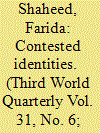

|
|
|
|
|
| Publication |
2010.
|
| Summary/Abstract |
In Pakistan, the self-serving use of Islam by more secular elements alongside politico-religious ones facilitated the latter's increasing influence and the conflation and intricate interweaving of Islam and Pakistani nationhood. A paradigm shift under Zia's martial law revamped society as much as state laws, producing both religiously defined militias and aligned civil society groups. Examining the impact on women of fusing religion and politics, this paper argues that women become symbolic markers of appropriated territory in the pursuit of state power, and that the impact of such fusing, different for differently situated women, needs to be gauged in societal terms as well as in terms of state dynamics. Questioning the positing of civil society as a self-evident progressive desideratum, the paper concludes that gender equality projects seeking reconfigurations of power cannot be effective without vigorously competing in the creation of knowledge, culture and identity.
|
|
|
|
|
|
|
|
|
|
|
|
|
|
|
|
| 3 |
ID:
098995


|
|
|
|
|
| Publication |
2010.
|
| Summary/Abstract |
This article explores the influence of religious actors on the elaboration of two public policies that are key to the advancement of women's rights and have long formed part of the women's movement's agenda in Chile: the introduction of sexual education in secondary schools in the 1990s and the distribution of emergency contraception in the 2000s. Our analysis of how different actors-from a variety of ideological and power positions-have influenced the two policy debates suggests that their discourses and strategies are highly contingent on the political environment. While conservative religious forces retain an enormous capacity to hinder policy making and implementation in the arena of family and sexuality, the government's determination to confront such interference seems to have grown in a context of fewer authoritarian enclaves, a more pluralist society and a strong sexual and reproductive rights movement. The diversification of religious positions on issues of family and sexuality has also affected the room for manoeuvre in the policy arena.
|
|
|
|
|
|
|
|
|
|
|
|
|
|
|
|
| 4 |
ID:
098993
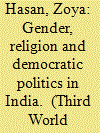

|
|
|
|
|
| Publication |
2010.
|
| Summary/Abstract |
This article examines the impact of identity politics on gender equality. More specifically it explores the paradoxical and complex relationship of religion and politics in a multi-religious society and the complicated ways in which women's activism has both reinforced and challenged their gender identities. Contrary to the argument that religious politics does not always negate gender equality, the article argues that the Hindu religious politics and women's activism associated with it provides a compelling example of the instrumentalisation of women to accomplish the political goals of the Hindu right. It also examines the approach and strategies of influential political parties, women's organisations and Muslim women's groups towards legal reform and the contested issue of a uniform civil code. Against those who argue that, in the current communal conjuncture, reform within Muslim personal laws or Islamic feminism is the best strategy for enhancing the scope of Muslim women's rights, the article argues that such an approach tends to freeze identities within religious boundaries. It shows how women's and minority rights are used within the politics of religion to sideline the agenda of women's rights.
|
|
|
|
|
|
|
|
|
|
|
|
|
|
|
|
| 5 |
ID:
098990
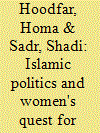

|
|
|
|
|
| Publication |
2010.
|
| Summary/Abstract |
The unification of a strong and authoritarian state with religious laws and institutions after the 1979 revolution in Iran has resulted in the creation of a dualistic state structure in which non-elected and non-accountable state authorities and institutions-the majority of whom have not accepted either the primacy of democracy nor the premise of equality between men and women (or Muslims and non-Muslims)-are able to oversee the elected authorities and institutions. The central question posed by this paper is whether a religious state would be capable of democratising society and delivering gender equality. By analysing the regime's gender policies and political development, the paper suggests that, at least in the case of Iran and Shi'ism, the larger obstacle to gender (and minorities') equality has more to do with the undemocratic state-society relations that persist in Iran and less to do with the actual or potential compatibility (or lack thereof) of religious traditions or practices with democratic principles.
|
|
|
|
|
|
|
|
|
|
|
|
|
|
|
|
| 6 |
ID:
098992


|
|
|
|
|
| Publication |
2010.
|
| Summary/Abstract |
his article explores the common ideological ground between Islam and Christianity in Nigeria, in the ways in which gender and sexuality are configured in relation to women's bodies. The latter constitute key sites for the inscription of social norms and practices inherent in particular interpretations of religion. We proceed by examining the interplay between religion and politics in historical context and in specific concrete instances. While the religious right among Muslims and Christians share the view that women's bodies are sexually corrupting and therefore in need of control, this perspective is also found in secular institutions. At the same time Christians and Muslims are strongly opposed to controls on women's bodies that may lead to either religious group being identified as 'the other'. The linkage made between women's bodies and 'public morality' produces diverse forms of gender inequality. The moralising of political economy that these processes entail complicates the terrain on which challenges to the politicisation of religion and its gender politics need to be sustained.
|
|
|
|
|
|
|
|
|
|
|
|
|
|
|
|
| 7 |
ID:
098996


|
|
|
|
|
| Publication |
2010.
|
| Summary/Abstract |
This article explores the complexities of the interaction between politics, religion and gender equality in contemporary Mexico, by analysing recent developments in public debate, legal changes and implementation of government policies in two areas: 1) the inclusion of emergency contraception in public health services in 2004; and 2) the decriminalisation of abortion in Mexico City in 2008, which was followed by a massive campaign to re-criminalise abortion in the federal states. Three main findings emerge from our analysis: first, that women's sexual and reproductive autonomy has become an issue of intense public debate that is being addressed by both state-public policy and society; second, that the gradual democratisation of the Mexican political system and society is forcing the Catholic Church to play by the rules of democracy; and third, that the character and nature of the Mexican (secular) state has become an arena of intense struggle within which traditional political boundaries and ideologies are being reconfigured.
|
|
|
|
|
|
|
|
|
|
|
|
|
|
|
|
| 8 |
ID:
098989


|
|
|
|
|
| Publication |
2010.
|
| Summary/Abstract |
This article examines the gendered implications of the intertwining of Islam and politics that took shape after the process of democratisation in Turkey had brought a political party with an Islamist background to power. This development revived the spectre of restrictive sex roles for women. The country is thus confronted with a democratic paradox: the expansion of religious freedoms accompanying potential and/or real threats to gender equality. The ban on the Islamic headscarf in universities has been the most visible terrain of public controversy on Islam. However, the paper argues that a more threatening development is the propagation of patriarchal religious values, sanctioning secondary roles for women through the public bureaucracy as well as through the educational system and civil society organisations.
|
|
|
|
|
|
|
|
|
|
|
|
|
|
|
|
| 9 |
ID:
098994


|
|
|
|
|
| Publication |
2010.
|
| Summary/Abstract |
This article argues that nationalism has connected religion with secular politics in Serbia but that their rapprochement has been a gradual process. In order to demonstrate the transition from a limited influence of religion on politics to a much tighter relationship between the two, this article discusses the abortion legislation reform and the introduction of religious education in public schools, respectively. It argues that, while illustrative of different types of connection between religion and politics, these two issues had similar implications for gender equality-they produced discourses that recreated and justified patriarchal social norms. After religion gained access to public institutions, its (patriarchal) discourses on gender were considerably empowered. The article points to some tangible evidence of a re-traditionalisation and re-patriarchalisation of gender roles within the domestic realm in Serbia.
|
|
|
|
|
|
|
|
|
|
|
|
|
|
|
|
| 10 |
ID:
098997
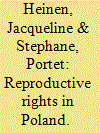

|
|
|
|
|
| Publication |
2010.
|
| Summary/Abstract |
The historical prestige of the Polish Catholic Church is the result of its presence as a national symbol of resistance, both under foreign occupation and during the communist regime. In the post-communist era the power of the Church within the political arena has significantly increased, through the Concordat that was signed with the state as well as through formal and informal ties with political parties. Catholicism is the de facto religion of the state, even if Poland remains a nominally secular country. This was illustrated by the adoption, in 1993, of a total abortion ban. Although the relation of Poles to the Catholic dogma on sexuality and reproductive rights tends to be weak, fearing criticism from Church authorities, most politicians avoid controversial topics and express their commitment to Catholic dogma. Thus women's groups have encountered serious difficulties in their efforts to defend women's rights to sexual and reproductive autonomy. Although accession to the European Union has put Poland in an awkward position with respect to equality of rights between women and men, it has not fundamentally altered the real situation with respect to the controversial topic of abortion.
|
|
|
|
|
|
|
|
|
|
|
|
|
|
|
|
| 11 |
ID:
098998
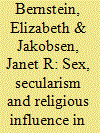

|
|
|
|
|
| Publication |
2010.
|
| Summary/Abstract |
Through an analysis of alliances between secular and religious actors in US politics and a specific case study on anti-trafficking policy, we show that the intertwining of religion and politics in the US comes from two sources: 1) the secular political and cultural institutions of American public life that have developed historically out of Protestantism, and which predominantly operate by presuming Protestant norms and values; and 2) the direct influence on US politics of religious groups and organisations, particularly in the past quarter-century of lobby groups and political action committees identified with conservative evangelical Christianity. The sources of policies that promote gender and sexual inequality in the US are both secular and religious and we conclude that it is inaccurate to assume that religious influence in politics is necessarily conservative or that more secular politics will necessarily be more progressive than the religious varieties.
|
|
|
|
|
|
|
|
|
|
|
|
|
|
|
|
| 12 |
ID:
098987


|
|
|
|
|
| Publication |
2010.
|
| Summary/Abstract |
This article explores how religion as a political force shapes and deflects the struggle for gender equality in contexts marked by different histories of nation building and challenges of ethnic diversity, different state-society relations (from the more authoritarian to the more democratic), and different relations between state power and religion (especially in the domain of marriage, family and personal laws). It shows how 'private' issues, related to the family, sexuality and reproduction, have become sites of intense public contestation between conservative religious actors wishing to regulate them based on some transcendent moral principle, and feminist and other human rights advocates basing their claims on pluralist and time- and context-specific solutions. Not only are claims of 'divine truth' justifying discriminatory practices against women hard to challenge, but the struggle for gender equality is further complicated by the manner in which it is closely tied up with, and inseparable from, struggles for social and economic justice, ethnic/racial recognition, and national self-determination vis- -vis imperial/global domination.
|
|
|
|
|
|
|
|
|
|
|
|
|
|
|
|
|
|
|
|
|